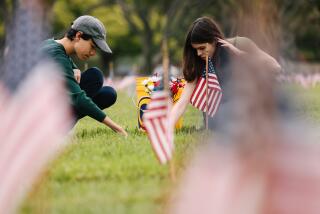Stigma of Murder Slows Plan to Build Monument to Victims
- Share via
There is a grassy spot that has been set aside on one of the carefully landscaped lawns of Rose Hills Memorial Park on the outskirts of Whittier.
The spot seems indistinctive, one of the many areas waiting to be occupied in the 2,500-acre cemetery. But Coleen Davis can look at that spot and see more than well-tended greenery.
She can see a monument in black marble, six feet tall, engraved with the words: “Dedicated to those who lost their lives in violent crimes.”
The walkway leading to the monument would be lined with small granite plaques, each bearing the name, birth date and date the victim was killed. It would be somewhere, said the mother of one victim, that family members “could at least have a place to go and put a flower” in memory of a life lost to crime.
It has been three years since Davis and other members of the Whittier chapter of Parents of Murdered Children started raising $35,000 to build the monument.
Cemetery Donates Space
Rose Hills donated the land, and with all the money people give to causes ranging from political campaigns to AIDS research, Davis figured coming up with the rest would be easy. But so far, there have been only $6,000 in contributions.
“I’ve found that people would rather give money to almost anything else” than a project to honor murder victims, Davis said. “Murder is an ugly word. People like to think it doesn’t happen, and especially that it doesn’t happen to decent people.”
Davis hopes interest in the project will be rekindled on Sunday, when a memorial service is scheduled for families that have lost a relative to murder.
Participants will meet at noon at the Santa Fe Springs Neighborhood Center, tie red and black ribbons to their cars, and form a procession to Rose Hills Memorial Chapel.
There, 50 to 60 photographs of murder victims will be displayed, and family members will be given a chance to say a few words about the dead. This will be the third year for the service, which also includes poetry and music.
“When we become victims, it’s comparable to becoming a leper,” said Julie Suwalski, 55, of Whittier, whose daughter died of alcohol poisoning after being forced to drink a fifth of whiskey. The daughter’s boyfriend was charged with second-degree murder and pleaded guilty to involuntary manslaughter.
“I have found that people kind of shy away from you. They don’t want to hear about this . . . because anything and everything seems to bring back that person you’ve lost,” she said.
Suwalski, who is raising her daughter’s two teen-age children in addition to caring for her mother who has Alzheimer’s disease, attended Parents of Murdered Children meetings for about five years. But recently, she said, her involvement has subsided.
“I make it my business to keep in touch with Coleen and I will attend that memorial service,” Suwalski said. “But you get to the point where you just can’t stand to hear another sad story.”
Davis, 57, became an activist in victim’s rights about nine years ago, after the murder of her 15-year-old son, Ben.
Stabbed to Death
While walking home from a party one night, Ben was pulled into a car, stabbed and thrown from the top of Turnbull Canyon, but managed to crawl to a road two days later, Davis said.
Ben was taken to the hospital and died after brain surgery. Two men were convicted in Ben’s death. One of them already is paroled from prison.
“The famous thing that people say to you is, ‘You have to get on with your life, you have to put this behind you,’ ” said Davis, who heads the only chapter of Parents of Murdered Children in southeast Los Angeles County.
“This is never going to be put behind you. You have to learn to live with it like cancer or any other personal ailment.”
And it is an condition that more and more people have in common. According to the FBI, there were 20,613 murders and non-negligent manslaughters in the United States in 1986, a 8.6% increase from the previous year. More than 1,400 of those were in the Los Angeles-Long Beach metropolitan area, an increase of 5.8%.
Drive-By Shooting
The mother of one of those statistics is Ollie Whitmore, 54, whose 21-year-old daughter, Jockla Faye, was killed in a drive-by shooting on the streets of South Los Angeles.
Whitmore attended Davis’ memorial service last year and said the ceremony served to replace the hazy memory of her daughter’s funeral in November, 1985.
“I can just remember going into the church,” she said. “Everything was just dark that whole day. . . . This way, by going to the memorial service, I can sit there and listen. It’s touching to me.”
Whitmore spends her days caring for her 5-year-old grandson, Mickey, who was 22 months old when his mother was killed.
“As long as I’m here and the baby’s here, she’s always here,” Whitmore said. “But it is something that you will just never forget,” Whitmore said of the murder. “It’s a lifetime of grief.”
More to Read
Sign up for Essential California
The most important California stories and recommendations in your inbox every morning.
You may occasionally receive promotional content from the Los Angeles Times.










